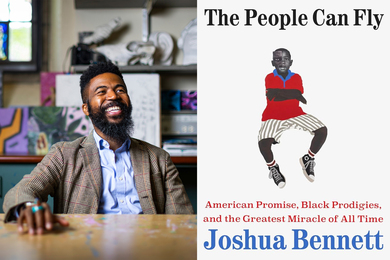Dr. Toyoichi Tanaka, professor of physics, has received the 1994 Inoue Prize for Science, awarded for outstanding achievements in basic sciences in general and given each year to a scientist under the age of 50.
The award, established in 1984 to honor Setsuko Inoue, consists of $20,000, a gold medal and a citation. It was presented in Tokyo in February.
The citation praises Dr. Tanaka "for the discoveries of phase transitions and critical phenomena in gels and foundation of physics of gels."
Professor Tanaka is a world leader in the field of polymer gel physics. His research has encompassed the whole scope of this field and has led to a fundamental understanding of the phase transition, critical phenomena, kinetics, dynamics and transport properties of polymer gels and the application of these principles in biology and engineering.
Gels, which are jelly-like materials, are widely used in the chemical, medical, agricultural and food industries. In the late 1970s, Professor Tanaka discovered that a gel can undergo reversible transition between swollen and collapsed phases. The fundamental principles which govern the swelling equilibrium and dynamics turned out to be a powerful paradigm for understanding the molecular basis of polymer behaviors in general. Application of the principles in engineering promises new materials and technologies with a broad spectrum of biomedical and chemical applications, including actuators, artificial muscles, controlled delivery systems, selective absorbants and sensors.
Last year, Professor Tanaka received the Vinci d'Excellence in France for his work. His other honors include The Award of the Polymer Society of Japan in 1986 and the Nishina Memorial Prize in 1985.
Dr. Edward N. Lorenz, professor emeritus in the Department of Earth, Atmospheric and Planetary Sciences, has added another award to the many he has received over the years for his pioneering contributions to the theory of deterministic chaos, a principle that has profoundly influenced a wide range of sciences.
The American Meteorological Society has named him as the 1995 recipient of its Louis J. Battan Author's Award. The award was presented to Dr. Lorenz in January at the AMS annual meeting in Dallas.
Dr. Lorenz was honored for his book, The Essence of Chaos, "which defines chaos and illustrates its special properties in a way that a thoughtful, nonspecialist audience can understand."
The award is presented to an author of an outstanding, newly published book on the atmospheric sciences of a technical or nontechnical nature, with consideration to those books that foster public understanding of meteorology.
Dr. Lorenz has spent the majority of his career teaching, researching and writing about atmospheric circulation, atmospheric predictability and chaotic dynamical systems.
Dr. Neil E. Todreas, Korea Electric Power Corp. (KEPCO) Professor of Nuclear Engineering, received the 1994 technical achievement award from the American Nuclear Society's Thermal Hydraulics Division. Professor Todreas was cited for outstanding technical accomplishments in nuclear reactor thermal hydraulic design and safety analysis, ranging from characterization of the energy exchange processes within reactor fuel assemblies to origination of innovative reactor design concepts. His role as a leading educator in nuclear engineering and as a participant on major nuclear energy advisory panels were also noted.
n Professor Henry I. Smith, the Joseph F. and Nancy P. Keithley Professor of Electrical Engineering and director of the MIT NanoStructures Laboratory, has been named the recipient of the 1995 Cledo Brunetti Award by the IEEE (Institute of Electrical and Electronics Engineers).
The award, which cites Professor Smith for "contributions to microfabrication science and technology, notably microlithography," recognizes accomplishment in the field of miniaturization in the electronic arts.
Dr. Edward B. Turk, professor of French and film studies in the foreign languages and literatures section, has been awarded the 1995 Levitan Prize in the Humanities. The $20,000 prize, first awarded in 1990, was established through a gift from James A. Levitan, a 1945 graduate in chemistry who is a Corporation member and senior partner of a New York law firm. The prize supports creative and innovative scholarship in the humanities by faculty in the School of Humanities and Social Science. Professor Turk will use the prize money to continue his research for a book, Jeanette MacDonald and the Decline of the Middlebrow in Twentieth-Century America.
Dr. Subra Suresh, Richard P. Simmons Professor of Metallurgy and professor of mechanical engineering, recently delivered the Shell Distinguished Lecture at Northwestern University.
The lecture is sponsored annually by the Shell Oil Co. Professor Suresh's lecture was based on his current research on the thermal properties of multi-layered materials being developed for applications involving structural coatings, electronic thin films, piezoelectric systems and solid oxide fuel cells.
Dr. Edward A. Boyle, professor of chemical oceanography in the Department of Earth, Atmospheric and Planetary Sciences, received the A.G. Huntsman Award from the Bedford Institute of Oceanography in Dartmouth, Nova Scotia. The award was established by the BIO to recognize excellence of research and contribution to the marine sciences. Dr. Boyle was recognized for accomplishments including his study of oceanic distributions of trace elements in seawater, and he was cited as "one of the most productive and imaginative marine chemists to emerge over the past several decades."
A version of this article appeared in MIT Tech Talk on March 8, 1995.





